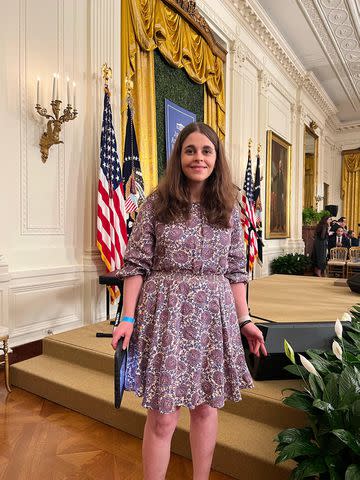Nonspeaking Woman with Autism Denied Effective Communication Tools Until Age 18 Now an Education Advocate
"After feeling so distraught and misunderstood for so many years, it feels really amazing — and yet, it hurts to know that my story is shared by so many," Jordyn Zimmerman tells PEOPLE

For the first 18 years of her life, Jordyn Zimmerman, who is nonspeaking and has autism, says she was treated as "subhuman" in the classroom and was controlled by others who assumed she was incapable of meaningful communication. But since receiving access to effective augmentative communication, she had the tools she needed to challenge the educational status quo.
"I was in a perpetual state of being frustrated, as not only did I have a huge human need to be with other people, but worse — because I could not effectively communicate with speech, there were many assumptions made regarding what I needed," the 28-year-old education advocate tells PEOPLE.
She adds, "I had so much language (different than speech) built up inside of me with things I wanted to share and ways I wanted to contribute, and yet, I couldn't make those thoughts clear. This all led to minimal connections, segregation, trauma, and limited learning opportunities."
Related:Army Vet and Father of 3 Children with Autism Builds Technology to Help the Physically Disabled
It wasn't until Zimmerman began using technology that her world opened up.
"I use an iPad mini with a text-based communication app (Proloquo4Text) where I type letter by letter, creating words and phrases, which are then shared aloud," she says.
"When I started typing through the iPad, it was challenging. Learning a new accessibility tool is hard, and being included in a community for the first time at age 18 was remarkably beautiful and challenging," she adds. "However, the educators who were in my life at that time, and the attorney from the state's protection and advocacy system who was advocating for my rights as a student with a disability were committed to my success."

"The education system was designed for a certain person and for a specific purpose. It wasn't designed for everyone or to meet the varying needs of students with disabilities, as they are, and as they want to be," Zimmerman says. "Lots of these prohibit people from being included and contribute to denying folks access. Challenging the status quo allows us to think through the 'why,' and then identify creative solutions — that's how we must move forward."
Never miss a story — sign up for PEOPLE's free daily newsletter to stay up-to-date on the best of what PEOPLE has to offer, from celebrity news to compelling human interest stories.
Now, Zimmerman has received undergraduate and master's degrees, become a keynote speaker, joined numerous boards, was appointed to serve on the President Biden's committee for people with intellectual disabilities, and has starred in the documentary This Is Not About Me.
"After feeling so distraught and misunderstood for so many years, it feels really amazing — and yet, it hurts to know that my story is shared by so many," Zimmerman says. "I think of it as a prime example of how we don't know what someone can do, or who someone may become until they are given access to the appropriate support and accessibility tools."

When speaking directly to others who have faced similar hurdles, Zimmerman says, "You are worthy. You are worthy if you don't yet have access to high-tech, robust communication technology, and you are worthy if you do."
"We need to be able to learn, communicate, connect with others, and engage in opportunities that create change," she adds. "If we want everyone to accomplish big things, we need to give everyone the space and access to the digital tools to do so!"
For more People news, make sure to sign up for our newsletter!
Read the original article on People.

 Yahoo News
Yahoo News 
